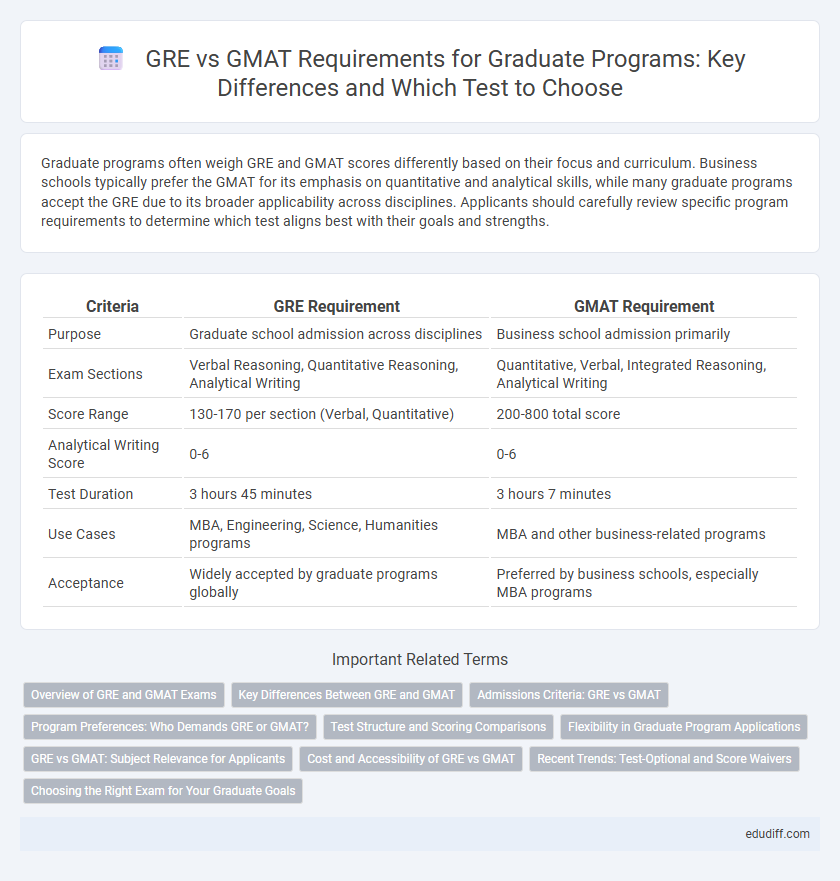Graduate programs often weigh GRE and GMAT scores differently based on their focus and curriculum. Business schools typically prefer the GMAT for its emphasis on quantitative and analytical skills, while many graduate programs accept the GRE due to its broader applicability across disciplines. Applicants should carefully review specific program requirements to determine which test aligns best with their goals and strengths.
Table of Comparison
| Criteria | GRE Requirement | GMAT Requirement |
|---|---|---|
| Purpose | Graduate school admission across disciplines | Business school admission primarily |
| Exam Sections | Verbal Reasoning, Quantitative Reasoning, Analytical Writing | Quantitative, Verbal, Integrated Reasoning, Analytical Writing |
| Score Range | 130-170 per section (Verbal, Quantitative) | 200-800 total score |
| Analytical Writing Score | 0-6 | 0-6 |
| Test Duration | 3 hours 45 minutes | 3 hours 7 minutes |
| Use Cases | MBA, Engineering, Science, Humanities programs | MBA and other business-related programs |
| Acceptance | Widely accepted by graduate programs globally | Preferred by business schools, especially MBA programs |
Overview of GRE and GMAT Exams
The GRE exam evaluates verbal reasoning, quantitative reasoning, and analytical writing skills, making it suitable for a broad range of graduate programs beyond business. The GMAT exam emphasizes analytical writing, integrated reasoning, quantitative, and verbal skills, specifically targeting business school applicants. Both exams assess critical thinking and problem-solving abilities but differ in structure and focus depending on the graduate program requirements.
Key Differences Between GRE and GMAT
The GRE and GMAT are standardized tests commonly required for graduate admissions, with the GRE accepted by a wider range of programs including many graduate schools beyond business. The GMAT focuses heavily on analytical writing, integrated reasoning, quantitative, and verbal skills tailored specifically for MBA candidates, while the GRE tests verbal reasoning, quantitative reasoning, and analytical writing with a broader scope for various graduate programs. Key differences include GRE's adaptive section-level scoring and the GMAT's question-level adaptive format, impacting preparation strategies and score reporting.
Admissions Criteria: GRE vs GMAT
Graduate admissions often require either the GRE or GMAT, with GRE acceptance expanding across business and management programs traditionally favoring the GMAT. The GMAT specifically measures skills in analytical writing, quantitative reasoning, verbal reasoning, and integrated reasoning, aligning closely with business school standards. Many top MBA programs accept GRE scores as equivalent, but some prioritize GMAT due to its focus on business-related competencies.
Program Preferences: Who Demands GRE or GMAT?
Top graduate programs in business schools typically prefer the GMAT for MBA admissions, emphasizing quantitative and analytical skills, while many STEM and social science graduate programs favor the GRE for its broader assessment scope. Competitive MBA programs often require GMAT scores to evaluate candidates' readiness for rigorous business coursework, whereas interdisciplinary or research-focused programs accept GRE scores due to their versatility across various fields. Some universities accept both GRE and GMAT scores, but applicants should verify specific program preferences, as business-centric programs usually prioritize GMAT, and generalized graduate programs lean toward GRE.
Test Structure and Scoring Comparisons
The GRE consists of three main sections: Verbal Reasoning, Quantitative Reasoning, and Analytical Writing, scored on a scale of 130-170 for verbal and quantitative sections and 0-6 for analytical writing. The GMAT is divided into four sections: Analytical Writing Assessment, Integrated Reasoning, Quantitative, and Verbal, with a total score range of 200-800 based on quantitative and verbal scores. Both tests assess graduate-level readiness but differ in structure, scoring methods, and emphasis on skills like data interpretation in GMAT's Integrated Reasoning section.
Flexibility in Graduate Program Applications
Graduate programs increasingly offer flexibility by accepting both GRE and GMAT scores, allowing applicants to choose tests that align with their strengths and career goals. Some business schools prioritize GMAT scores for competitive MBA programs, while others equally recognize GRE scores to widen the applicant pool. This adaptability enhances candidates' opportunities to demonstrate their abilities through preferred standardized tests in graduate admissions.
GRE vs GMAT: Subject Relevance for Applicants
GRE and GMAT tests differ in subject relevance, with the GRE emphasizing verbal reasoning, quantitative reasoning, and analytical writing, suited for a broad range of graduate programs. The GMAT focuses more on quantitative skills, data interpretation, and business-related analytical writing, making it preferred for MBA and business school applicants. Applicants should choose the exam that aligns with their academic background and program requirements to maximize their application success.
Cost and Accessibility of GRE vs GMAT
The GRE exam generally costs around $230 globally, whereas the GMAT fee is approximately $275, making the GRE a more cost-effective option for many graduate school applicants. GRE testing centers are more widely available across numerous countries and offer greater flexibility with test dates compared to the GMAT, which has fewer international locations and stricter scheduling. Accessibility and affordability of the GRE contribute significantly to its popularity among prospective graduate students seeking a versatile and budget-friendly admissions test.
Recent Trends: Test-Optional and Score Waivers
Recent trends in graduate admissions show a growing shift towards test-optional policies and score waivers for both GRE and GMAT requirements, reflecting increased flexibility amid changing applicant preferences. Many top business schools now accept applications without standardized test scores or offer waivers based on academic achievements, work experience, or other credentials to reduce barriers. This shift aims to promote diversity and inclusivity while maintaining rigorous evaluation standards in admissions processes.
Choosing the Right Exam for Your Graduate Goals
Choosing between the GRE and GMAT depends on your graduate program preferences and career objectives, as many business schools accept both exams but often prefer the GMAT for MBA admissions. The GRE offers broader flexibility for applicants targeting graduate programs in various disciplines beyond business, while the GMAT emphasizes analytical writing, quantitative reasoning, and integrated reasoning skills tailored for business management. Assessing program-specific requirements and aligning your skills with exam formats ensures selecting the most strategic test for achieving your graduate goals.
GRE Requirement vs GMAT Requirement Infographic

 edudiff.com
edudiff.com